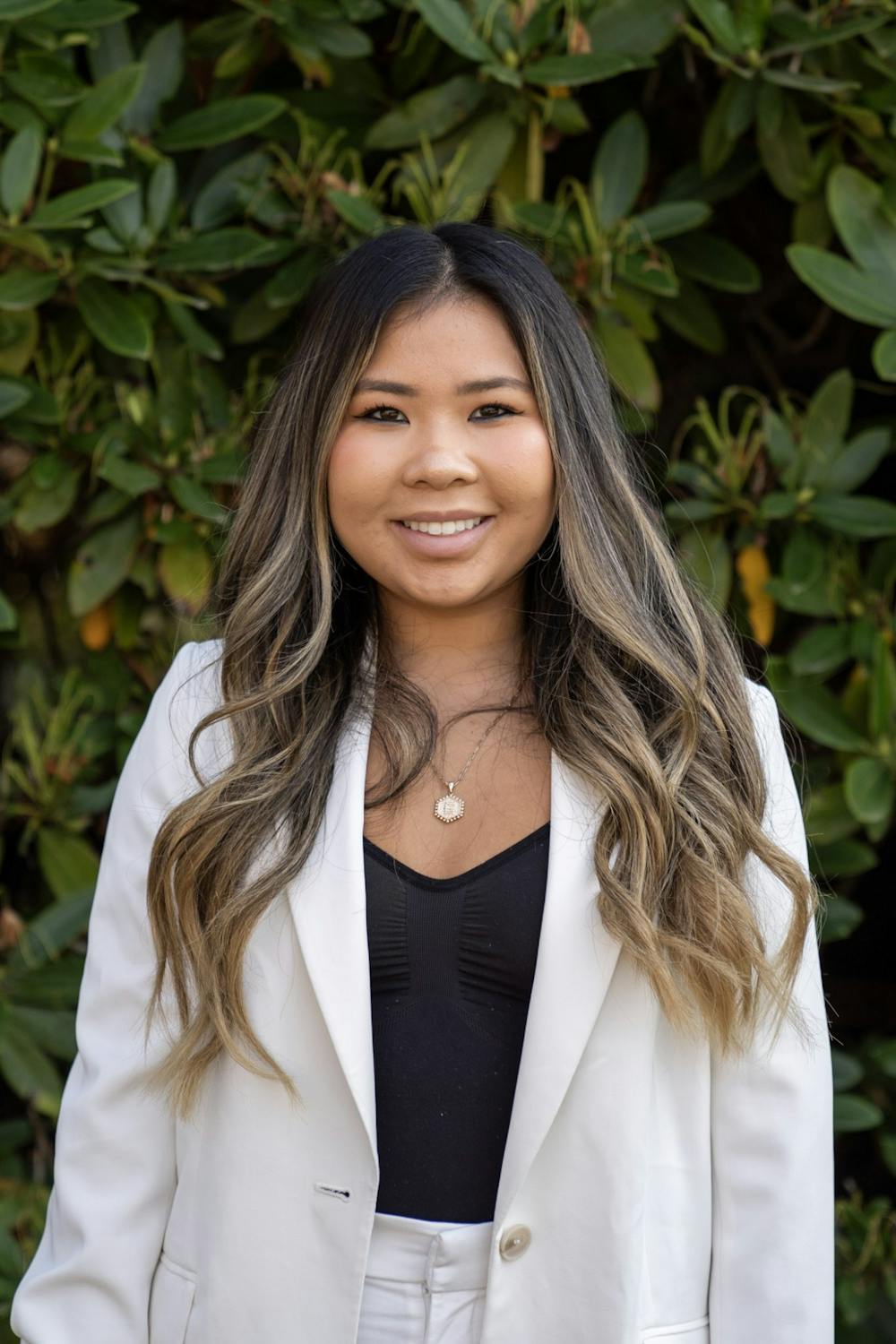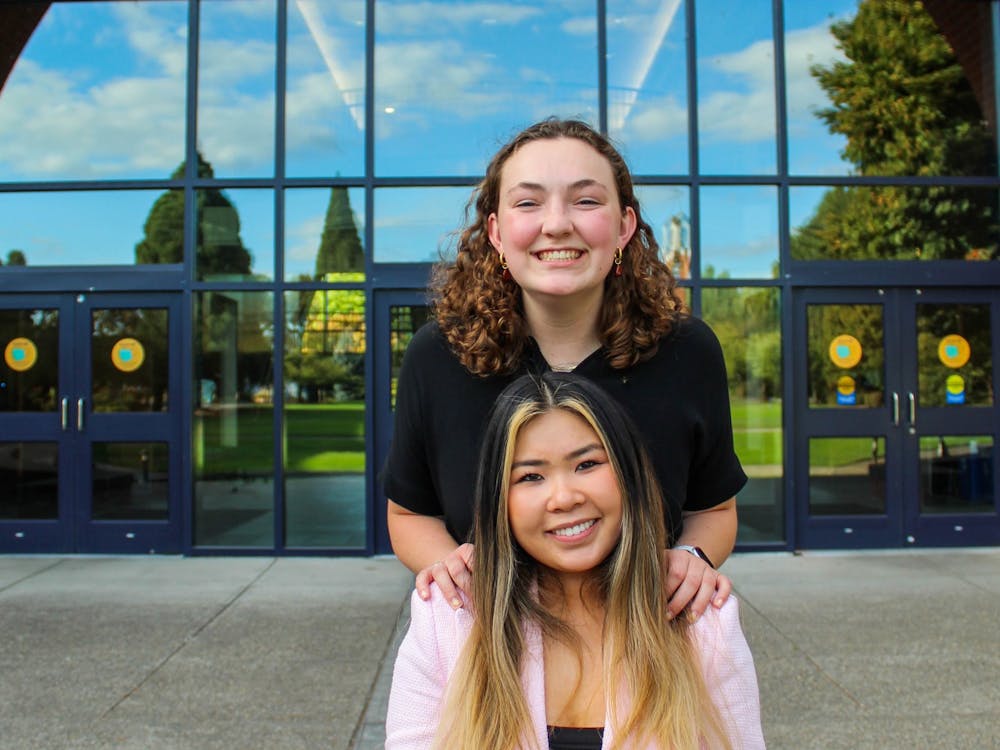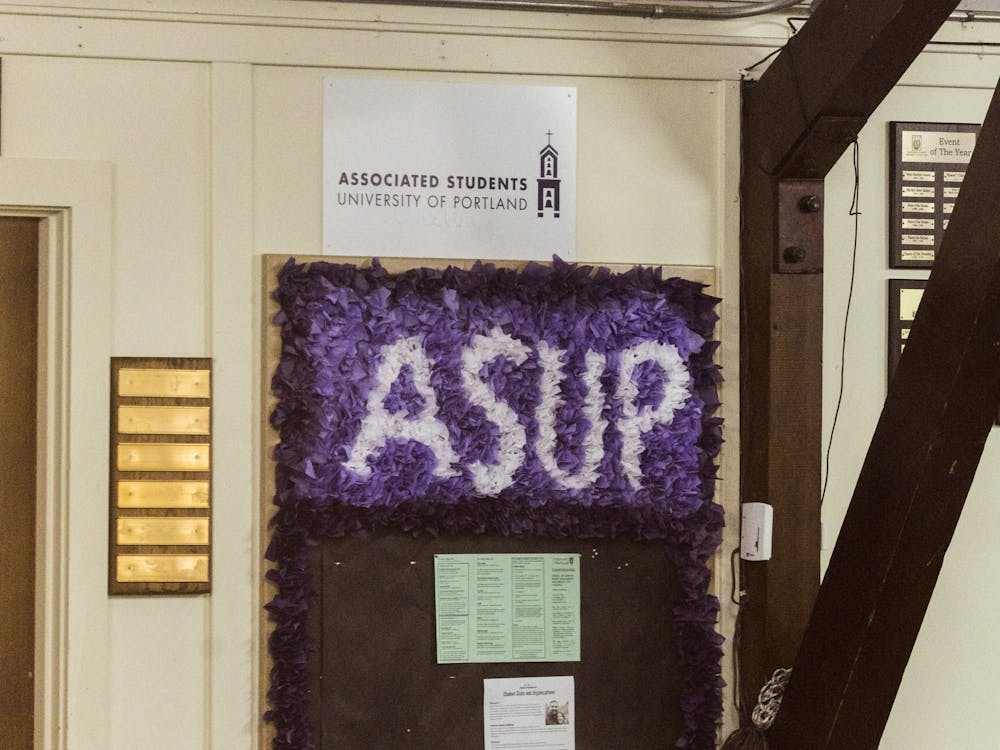Introduction
Welcome everyone. It’s an exciting time to reflect on what we’ve accomplished during this fall semester. My name is Emma Fuller, and this is my second year as ASUP President. One year ago, I was here giving my first state of the campus address and I am so honored to be standing here again giving this year’s address.
Last year, a major highlight of my address was coming back to in-person learning after a year and a half of a global pandemic. UP was adaptive and we had an extremely successful year. This year, there is a new energy in the air. No more masks, a new university president and a new incoming first-year class.
Things are looking up for UP and we can envision amazing years ahead. In this speech, I will be touching on the campus climate for Fall of 2022, ranging from our new president to budget cuts to the cultural shift we are seeing on campus. I hope you enjoy my address.
What’s new and exciting
At orientation weekend, as soon as I stepped onto campus, I felt a new atmosphere. The Class of 2026 spent almost their entire high school experience online and I could tell they were hungry to get involved.
During the President’s Welcome, Wellness Fair and Riverboat, it was clear that this year may have a record turnout for student events. Over 3,000 people attended Riverboat, breaking records and setting the tone for an amazing year ahead. We are closing one chapter and another is opening with renewed energy and enthusiasm.
Let’s start with our new president. On July 1, 2022, Robert D. Kelly began his journey as University of Portland’s 21st president. Kelly is the first lay person and African American to be our school’s president. Since the first day of school, we have seen him everywhere: in the Pilot House, marching in a kilt with the Villa Maria Drum Squad, and even on the quad handing out ice-cream on the first day of school.
His excitement and passion for UP is rejuvenating our community. He is already bringing new and fresh perspectives and opening up important and necessary conversations. He has truly been a beacon of hope on the bluff.
Continuing with his journey, on Friday, Sept. 23, we had Kelly’s grand inauguration and it was an event of a lifetime. After more than seven months of planning, including weekly meetings, the inauguration was a beautiful series of proceedings:
- At 11:00 a.m., we started with an all-school mass in the Chiles Center.
- Then at 3:15 p.m., we had the main event, the inauguration of Kelly. The energy was high and there were so many new faces present to support Kelly and see the University of Portland. With the stage lights, big screens and giant University of Portland logo hanging in the back, it was an impressive and beautiful event. We had people there representing many different aspects of the school, including top donors, past presidents, the board of regents and more. We also had over 100 different higher education institutions represented and there to support Dr. Kelly. I have never felt this much positive and hopeful energy. The excitement, love and support were overwhelming!
- The night ended with a dinner and dance. The dance was filled with students, faculty, staff and administration all dancing together.
These inaugural events felt like the best demonstration of what the University of Portland is all about and the special community we have on campus. Afterward, we had so much positive feedback about how impressed people were by our school and how they could see why Kelly chose the University of Portland and vice versa. History was made, and we were all there to not only witness it, but be a part of it.
Another exciting school event was the leadership conference. On Nov. 13 we hosted the Student Government Leadership Conference. This conference was different from those we held last year, because we had three school university presidents attend including the president of Linfield University, Miles Davis, the president of Lewis and Clark College, Robin Holmes Sullivan and our own school president, Robert Kelly.
Together, they provided valuable insights into the importance of student government, communication advice and ways to translate skills we’ve acquired to post graduate life. It was a huge success and a special sight to see all three presidents in a room together.
Seven universities were represented: University of Portland, Linfield University, Lewis and Clark College, Willamette University, Oregon State University, Portland State University and The Oregon Institute of Technology.
Student leaders were able to come together to discuss key issues on college campuses and form relationships, which is so important as being a leader can be isolating and at times, scary. My hope is that this conference continues for years to come and is hosted by other schools in addition to the University of Portland. Perhaps one day, we can have all the university presidents represented.
Highlighting an amazing and innovative event on campus, Alpha Kappa Psi has launched a professional clothing swap closet for students to provide an easy and equitable way for them to access professional clothing. They started this idea with a clothing swap in the fall supported by donations from the chapter, students, and many faculty members.
They held a two-day event where they helped students pick out clothes that made them feel confident and ready to interview or professionally present themselves. They are now moving these clothes into a permanent space in Franz Hall where students will have ongoing access whenever they need it. This initiative was led by Vice President Megan Meckey.
Additionally, the Vote UP working group has joined the ALL IN Democracy Challenge to help engage students with voting. They’ve also created resources to support and educate students. The University of Portland was awarded a Platinum Campus award for the 2020 election for having a 80-89% voting rate. During the midterm elections this fall, Meckey created a guide for students to help educate them on the elections as well as providing resources to help them vote by mail. In addition, she helped host a perspective of the midterm elections event with faculty members. This event helped reignite the Vote UP initiative across campus.
To wrap up this section of what’s new, we’re seeing staff hired for new positions, like the new Wellness Director and Title IX Coordinator. Additionally, new positions are being announced, and I see this as an opportunity for students to be involved in the interview process and have a say in who they want the new leaders of campus to be.
With the new strategic plan approved and a new university president, students have the chance to speak up and help shape the future of UP.
The next part of my address includes changes we’re experiencing and issues we’re facing.
What’s changing
1) We have a new focus on health issues.
Early in the semester — after meeting every week on Wednesday morning for the past two years — the COVID Steering Committee has decided to complete its work on COVID. With a new focus, this committee is now transitioning to being the Committee for Infectious Diseases. It will be sponsored by the Health and Counseling Center, where meetings will occur.
2) We need to make adjustments due to a budget shortfall.
Our school announced that we have $13.4 million less than what we had budgeted for this academic year.
This is a significant loss, and we immediately faced a hiring freeze. Additionally, with re-budgeting, some positions are not coming back and people are going to have to do even more than what they are doing now.
Student organizations will also need to make adjustments. First, I’ll discuss what the Campus Program Board (CPB) is doing and then I’ll focus on the actions of the Associated Students of the University of Portland (ASUP).
CPB
Our school is experiencing some major cultural shifts, and CPB is adjusting. This year, we sold around 700 tickets and had 500 people attend the Chaos in the Cosmos Dance. In the past, these dances were one of the highlights of the year, but this year we saw less of an interest from the student body.
As a result, CPB wants to re-work the way that they do events to create more flexibility. They want more diverse events, and ones that cost less. While they may keep one dance, they would like to see an event with more socializing and more food. One idea they’re considering is having small food and activity pop-ups for different holidays. Since they want to do a major rebranding, they are looking for student input to make sure they are creating experiences that students want.
In summary, they don’t want people to think they’re completely changing CPB. Rather, they are reformatting it to make it work for the current student body with essentially four events: Rock the Bluff, Riverboat, an on-campus event and an off-campus event.
ASUP
As an organization, ASUP is down around $30,000 dollars. We’re fortunate, because this does not affect us that much. While the administration is working hard to make sure none of the cuts affect students directly, students are still feeling the cuts through gaps in staffing and fewer faculty members.
As a result, it is our job as student government to step up to protect and enhance the student experience. We will need to continue working together to make sure students’ needs are being met.
More than ever, it’s important to consider the needs of students because as the budget cuts are made, we’ll need to make difficult decisions. This is a time where the student voice really matters.
To strengthen our voice, we will need to create feedback loops and bring forward the issues that matter to us as student government. We have been working hard to meet one-on-one with stakeholders to form relationships and create a direct channel of communication.
We also want to focus on making ASUP and the senators the strongest they can be. Through working on the way the senate functions, getting involved and promoting all the amazing things that are happening on campus, we will lead by example to get students involved and make their experience a great one.
ASUP’s new priorities for the year
As a result of the budget cuts, ASUP has decided to refocus our priorities for this fall and spring. In the beginning of the year my executive board met, and we came up with these common goals for the year: Connectedness, Continuity, Relationship Building, Student Engagement and Promoting DEIJ events.
Connectedness:
One of ASUP’s key missions is to connect with one another, with students, with faculty and staff, with administration and with all of our campus partners. Connecting with each of these groups is what keeps our work meaningful. This year we’ve worked on connectedness within our own ASUP during our fall retreat, where we worked on getting to know one another and how to best serve in our roles, and through the Leadership Conference with other student governments in the area. We are continuously working to connect with students through many different avenues. This year we have been working hard to collaborate with clubs through the different services we offer as well as through our office hours. Our senators are being creative with where they hold their office hours to reach the most students. We are also working with faculty and staff to connect to all the different areas of the work they do. From sitting in on the Academic Senate, to school town halls and doing committee work with different staff members, we are connecting on a variety of projects to create a model of collaboration in executing on these projects. Maintaining connection with our administration through meetings and hosting them at senate meetings allows us to talk about larger campus issues, such as retention and collaboration across departments. Each senator and executive board member has taken on the responsibility to stay connected with each of these groups on projects that matter to them and their constituents. Whether it’s helping connect students to academic resources, providing them with tickets to NCAA soccer playoff games to root for our teams or showing our support for our new president at his inauguration, our ASUP has made connectiveness a key focus of our work this year.
Continuity:
How can we make sure senators’ efforts will not be lost and future senators can leverage their work? A group of senators and executive board members are coming together to write continuity documents for committee chairs, senators, executive board members and service directors. Our goal is to make passing the baton an easy and informative experience so new members of ASUP come in with the tools, resources and support that they need. It is also helpful for them to have a context before starting their own projects. By the end of the semester, we plan on having the continuity bill with transition document templates ready to go and voted on by the senate at the beginning of the spring semester. Additionally, we are hoping to end this school year with an organized P-drive so future officers can access all the new information we have created. This initiative is so important because our time at UP is so short and usually big change happens in more than four years, especially in higher education. Why start from scratch again and again on initiatives that people have already worked on in the past, when you can just pick up where they left off?
Student Engagement:
How can we effectively use our office hours? Additionally, we have made a shift in what the requirements of office hours are. For example, we have seen that office hours in Saint Mary’s are not the best use of time as not many people show up. We have been encouraging the senators to hold their office hours in places that already have many students, such as the Pilot House or library. Senator Backus does a great job at this by tabling in the Shiley School of Engineering lobby during his office hours. We also want to make sure that constituents know who their representatives are, so we are putting up photos of the senate representatives outside the ASUP office, on the Instagram and around campus. In addition, ASUP bought 150 tickets each for the first games of the first round of the men’s and women’s NCAA tournaments. ASUP has also staffed tables at both games, handing out doughnuts and ASUP swag. We hope to also volunteer to help with Stock UP, a monthly pop-up food pantry for students and community members facing food insecurity. These are great examples of putting ourselves out there and getting involved in the community. We will continue to encourage these types of initiatives and effective use of our office hours.
Promoting DEIJ Events:
With the delay in setting the DEIJ initiatives, what can we do to promote our own DEIJ activities? We have been emphasizing the importance of coming to events to support UP’s clubs and organizations. Supporting school events and celebrating the work and the people who are doing it is the best thing we can do. Additionally, the new diversity center opened on Nov. 14 and it is a great space for students to use. There are study rooms, commuter lockers, a kitchen, offices and a lot of space for students to gather and hang out. In fact, clubs are already using it. Yes, we can always push for more, but it is also important to acknowledge and take advantage of the resources we do have and the work that is being done already.
Relationship Building:
What can each of us do to build relationships? The senate has prioritized creating relationships with administration in particular. To do this successfully we have talked about coming into meetings having done your research, assuming good intentions from others and focusing on building relationships rather than assuming it will automatically happen. After being in the senate for four years, this is what I have found to be the most important thing to know and remember:
When working with anyone, especially administration, you are not going to get anywhere with a bad attitude or hostility.
Often, it can be hard when student wants and administration actions are not in line but relationship building is the only way to working with one another versus against one another and therefore making positive change.
I can already see the senate’s efforts paying off. This year, we are seeing a new level of trust from administration. There is more transparency, and we are working alongside one another instead of against each other.
Senators are forming relationships with administrators and the overall atmosphere has improved. This dynamic has not always been the case with ASUP and administration.
We feel our goals of Connectedness, Continuity, Relationship Building, Student Engagement and Promoting DEIJ Events are attainable and will help build a solid foundation for the senate.
Changes to the ASUP Mission Statement:
Later this semester, we updated our mission statement. The new mission statement includes the following:
“ASUP serves and represents all UP students by actively seeking their opinions and encouraging participation. As leaders, it is our privilege and responsibility to foster community — based upon justice, integrity and respect. Through transparency, professional communication, and proactive involvement, we hope to strengthen the current UP community as well as build a foundation for future generations.
ASUP also encourages and values respectful discourse where we uphold compassion, decorum, dignity, collaboration and accountability to best serve our constituents. All elected officials and visitors should receive that same respect.
ASUP actively works as one to advocate for and serve the student body at the University of Portland.”
This statement change is in light of a meeting we had on Oct. 10, 2022, where we lost sight of the mission and values of ASUP. This mission statement will not completely solve the senate dynamic, but it is a good first step to a positive and inclusive atmosphere in ASUP. This mission statement was then voted in by the senate to put in the bylaws.
Ending strong, the senate is now on an upward slope, focusing more than ever on relationship building and getting back on track to what we are here to do, which is to enhance the student experience. As I said at the beginning of this talk, with the changes happening and cuts being made, it is ASUP’s job to raise students’ voices and concerns. Given all the collaboration we have seen this year between ASUP and the administration, I feel that administrators, more than ever, want to hear student feedback and work together.
Conclusion:
I would like to end by acknowledging the hard-working ASUP members.
Megan Meckey, vice president
Graham Finch, director of finance
Kianna Storm, director of communications
Jessica Yoshioka, Campus Program Board director
Miguel Navarro, speaker of the senate
Aidan Sanchez, freshman class
Marie Tischer, freshman class
Kayako Olson, sophomore class
Michael Hauger, sophomore class
Matthew Bensurto, junior class
Angela Wipfler, senior class
Andrew Jones, senior class
Owen Hendricks, College of Arts & Sciences
Nano Munoz Navarro, College of Arts & Sciences
Ronit Chopra, Pamplin School of Business
Kaden Rossi, Pamplin School of Business
William Heyler, School of Education
Samone Watkins, Shiley School of Engineering
Denver Backus, Shiley School of Engineering
Tate Harris, School of Nursing
Bea Walker, School of Nursing
The state of the campus is hopeful, energetic and ready for a new chapter.
With the new strategic plan approved, the new university president in place and the Class of 2026 eager to become involved, the campus is full of new life, despite the budget cuts due to under-enrollment.
As the University of Portland is re-budgeting and reprioritizing, it is the best time for the student government to take leadership and advocate for the needs of our student body so we can enhance the student experience and pave the way for UP’s bright future. And for students, it’s the perfect opportunity to voice your opinion about issues that matter to you and all of us.
While there are always bumps in the road and this year is no exception, UP is resilient and its love for its students and our community will be what puts us on top. Thank you.
Emma Fuller is the ASUP president. She can be reached at fuller23@up.edu.
Have something to say about this? We’re dedicated to publishing a wide variety of viewpoints, and we’d like to hear from you. Voice your opinion in The Beacon.








